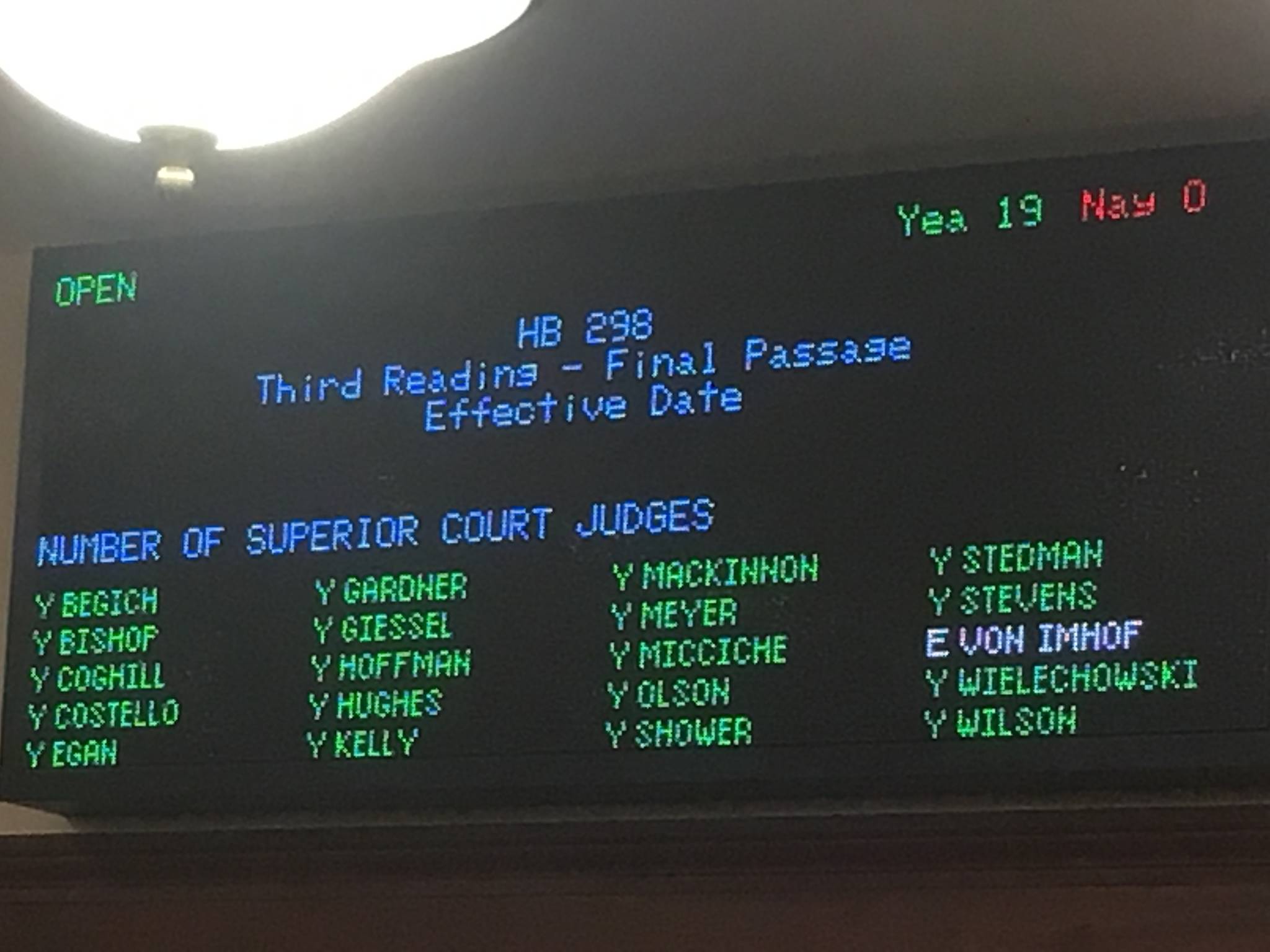The Alaska Legislature has approved a proposal by the Chief Justice of the Alaska Supreme Court and Gov. Bill Walker to add a third superior court judge to Juneau’s Dimond Courthouse.
In a 19-0 vote Monday morning, the Alaska Senate approved House Bill 298, which authorizes the court system to transform one of Juneau’s two district court judgeships into a superior court judgeship.
The bill now advances to Walker for his signature. The House voted 36-0 on Feb. 23 to approve it.
If Walker signs the bill as expected, the measure will leave Juneau with one district court seat and three superior court seats. A district court typically handles misdemeanor-level infractions, while superior court typically handles felony-level offenses. In his State of the Judiciary speech to the Alaska Legislature earlier this year, Chief Justice Craig Stowers told lawmakers that Juneau is seeing an increased number of felony cases.
According to figures provided by the Alaska Court System, Juneau’s superior court sees 590 filings per judge per year, the most of any court other than Anchorage, which has other resources to accommodate demand.
The court system has shifted judges from Sitka and Ketchikan as needed, but transportation costs have mounted, and cases in those two cities have suffered as a consequence of judges’ split duties.
Stowers said his preference would have been to simply add a judge, but the state’s multibillion-dollar budget deficit precluded that option.
Instead, Stowers offered an alternative made available by the pending retirement of Juneau District Court Judge Thomas Nave. When the judgeship becomes open, the state could change it to a superior court judgeship in what Stowers called “a limited-time offer.”
That idea became HB 298. No new staff will be added under the bill, and the salary difference between a district court judge and a superior court judge (about $35,000) will be borne by the court system.
With only one district court judge in Juneau, the new superior court judge will be expected to take some district court cases as well.
Suzanne DiPietro, director of the Alaska Judicial Council, said that pending the governor’s approval of the bill, the council will begin advertise the new judgeship in June.
Reinsurance bill passes Senate
In other business Monday, the Alaska Senate voted 19-0 to reauthorize the state’s medical reinsurance program. That program, passed by lawmakers in 2016, was intended to help cover the cost of Alaskans who may have difficulty finding medical insurance because of existing severe medical conditions. Senate Bill 165 advances to the House for consideration.
Shower to stay independent
Sen. Mike Shower, R-Wasilla, has decided against joining the Alaska Senate’s majority caucus, he said after Monday’s floor session. Shower, who was sworn into the Senate last week, replaced fellow Republican Mike Dunleavy, who broke with the caucus over disagreements regarding the state budget.
With Shower’s decision, the Senate majority has 13 members; 12 are Republicans and one is a Democrat. There are five members of the Democratic Senate minority, and Sen. Shelley Hughes, R-Palmer, is also not a member of a caucus.
Shower said that although he is not a member of a caucus, he may eventually choose to vote with the Senate majority on budgetary matters or other bills.
House reauthorizes boards
While the Alaska Senate met Monday morning, the Alaska House of Representatives was also in session. In quick order, it passed four bills reauthorizing various boards and commissions overseeing particular professions.
House Bill 275 (massage therapists), House Bill 278 (real estate appraisers), House Bill 279 (real estate commission), and House Bill 280 (martial and family therapists) all passed the House by large margins.
Each advances to the Senate for consideration.
Tax deduction bill advances
In other business Monday, the House also voted 35-1 to approve House Bill 96, sponsored by Rep. Steve Thompson, R-Fairbanks. The bill repeals four tax deductions and fee waivers in order to raise an additional $340,000 in the next fiscal year for the state budget.
The bill’s provisions affect businesses that pay the state’s tobacco tax, cruise ships that allow gambling, and businesses investigated under the Alaska Business License Act.
HB 96 advances to the Senate.
• Contact reporter James Brooks at jbrooks@juneauempire.com or call 523-2258.

